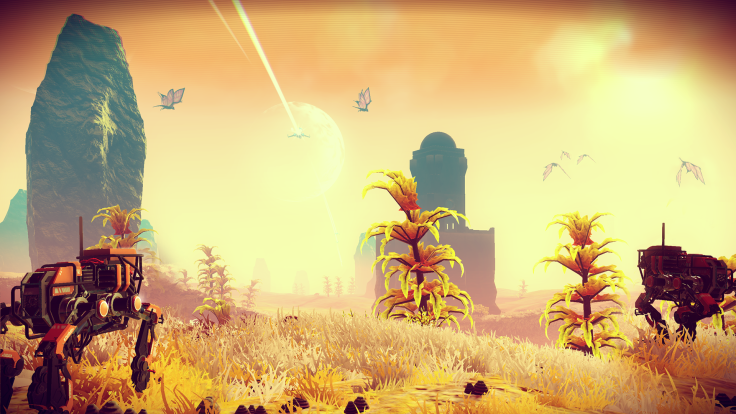No Man’s Sky promises to bring the magic of exploration back to sci-fi games. It promises an infinite galaxy where you can choose to be whatever you want, procedurally-generated worlds spiraling into the cosmos without end, and the feeling of adventure and exploration that can only really come from space, the final horizon. In No Man’s Sky, you enjoy effortless ease of access to different worlds, spaceships that can send you soaring from an alien landscape to orbit in seconds and always new planets to explore.
It’s been awhile since we had a sci-fi game that so enshrined the wonder of exploration as a major point of appeal. The No Man’s Sky web site pitches the game in a single perfect sentence: “A science-fiction game set in an infinite procedurally generated galaxy.”
Developer Hello Games has been careful to steer people away from thinking that elements like alien languages and trading with factions mean the game has a narrative beginning, middle and end. But the great thing about procedurally generated gameplay is how much it invites you to create your own story – a dynamic story that changes with every new world. The game creates itself with you in moments of magnificent happenstance.
That’s different from an RPG like Mass Effect, where the tunneling force of its own narrative slowly pushed exploration out of the games. In Mass Effect 1, you could touch down on any world you wanted with the help of your trusty Mako. Alien horizons blossomed, by turns bleak and unforgiving, lush and menacing, rich with hidden wealth or barely worth the time it took to corral the Mako over that mountain range.
Mass Effect 2 ditched the unpopular Mako for the even more unpopular planetary scan game. Sure, there was still the thrill of discovering Easter eggs in the descriptions of planets like Klendagon, but you never got to touch down on random alien surfaces anymore. And by Mass Effect 3, there was no longer even the pretense of exploration. The structure of the narrative that Bioware built – a good narrative, sometimes even a great narrative – precluded any procedurally generated moments of greatness.
That loss of the feeling of exploration, a wondrous appeal that’s built into the foundation blocks of sci-fi, made the infamous ending to Mass Effect even harder to swallow. But where else can you find that uniquely sci-fi sense of wonder?
The closest thing I’ve found to the magic of galactic discovery comes from 4x strategy games set in space, but 4x strategy concerns itself with exploration as a means to the exploitation of resources, a set-up for almost inevitable war. War always looms in the background of Stellaris or Beyond Earth, and while the feeling of unlocking the map in the early game is great, you lose that wonder in the mid and late game. But No Man’s Sky won’t punish you with war just for exploring; instead, it rewards you for everything you discover. It’s Star Trek the TV series, not Star Trek the movies. It’s boldly going.
No Man’s Sky feels like the return of the Mako. It promises to be the early game in a 4x, ad infinitum. The procedurally-generated size of the No Man’s Sky universe enables and even enforces a larger pacifism. Sure, you can have little space spats if you want, but you can also duck and hide in a billion planets where they’ll never, ever find you.
Best of all, there’s no tricolor ending to ruin No Man’s Sky, because the story is all in my head, built procedurally.


















